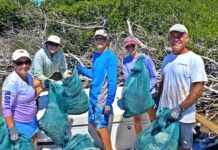
Members of the village’s Local Planning Agency are sending new regulations for farmers markets to the village council for consideration next month.
An operator of the longest running farmers market in Islamorada said proposed regulations have “deal killers” that could end his market, held every Sunday at MM 81.
At a March 28 meeting, LPA members recommended approval of an ordinance that establishes a list of new regulations and procedures related to farmers markets within the village. LPA members have discussed farmers market regulations, specifically what separates them from flea markets and fairs. Per Islamorada Planning Director Dan Gulizio, a farmers market constitutes farm produce and items such as local food, drinks and plants that are made in Florida and not a processed product distributed widely outside the state.
“We took these from similar ordinances from other municipalities in Florida,” he said.
Per the staff analysis, a farmers market does not include private garage sales, flea markets, fairs and similar activities held by places of worship.
Under the proposed ordinance the LPA is recommending, 40% of the goods sold at farmers markets must be local fruits, vegetables and plants. It was originally set at 51%, but Vice Chair Lorie LaLonde felt 40% was appropriate for an area that doesn’t have local produce farms. LPA members agreed.
“I think the public at hand, when they see the sign for a farmers market, their expectation is that the products found at that market are predominantly fruits and vegetables and consumable items, not necessarily clothing,” she said.
Farmers markets can also sell local jams and honey, locally-grown teas and spices, on-site preparation of juices, smoothies, coffee and similar items as determined by the village.
Jans, who runs the Florida Keys Farmers Market, said before Lalonde’s proposal that 51% farm produce would close his farmers market in Islamorada.
“There’s no way we could successfully run a market with that kind of restriction on products. We’re just going to close shop,” he said.
Farmers markets are allowed in village center, highway and neighborhood commercial districts. Farmers markets can operate one day a week between 9 a.m. and 4 p.m., but they can’t be within 1 mile of one another. Gulizio said that provision can be modified by the village manager or council, but the intent was to ensure there isn’t a concentration of farmers markets that cause traffic, safety hazards along the road and impacts to residents’ quiet enjoyment.
There’s also a cap proposed on the maximum number of vendors, 30. The village manager or the village council can reduce the vendor number based on individual lot size, parking availability and traffic safety concerns. It also requires restroom facilities on site, either porta potties or access to buildings, and establishes parking requirements for patrons, vendors and any other operations taking place on the property.
Those producing farmers markets are required to submit a site plan application and must obtain a temporary use permit. Gulizio said those applying for a temporary use permit would be good for the year.
“We’re not looking to have a temporary use permit every week,” he said. “We also want the opportunity to review the use through a temporary use permit and site plan review.”
As a small business, Jans said they could commit anywhere from $10,000 to $15,000 to get a site plan done.
“I don’t think it’s right to also require a temporary use permit. If we’re applying once a year for a temporary use permit, it’s not temporary in nature.”
The proposed ordinance would establish a market manager as a single point of contact to ensure farmers markets are operating under the rules. Gulizio said it would also ease the permitting process.
LPA member Susan Raffanello acknowledged that the regulations aren’t unfairly imposed when looking at what others deal with for their businesses. A farmers market is an ancillary use to an existing building, she said. Businesses go through site plan approval, use permits, inspections and certificate of occupancy, among other requirements.
“We’re looking more broadly at Islamorada regulations and the future of regulations as opposed to a custom fit,” she said.
Craig McBay, Islamorada Chamber of Commerce board member and owner of Florida Keys Brewing Co., said the proposed ordinance addresses issues that chamber membership had. In his comments, McBay noted how Art Walk, held every third Thursday at the Morada Way Arts & Cultural District, evolved over the years. What started with a few businesses quickly grew to more participants.
“Eventually we had to start getting permits when we never had to get permits before. We had to come in front of the village every year for our new permits,” he said. “There were things we had to comply with and we always did. Unfortunately, that’s what happens with successful things; they get bigger.”
Andrea Segovia said she’s given up many Sundays to run the farmers market at MM 81. She urged LPA members to consider grandfathering the Florida Keys Farmers Market.
“We have invested so much into this,” she said.
Chairwoman Deb Gillis said she doesn’t see the proposed regulations as being aimed at farmers markets currently operating. Moreover, it’s aimed at the village as a whole.
“It’s a popular thing these days. It’s time for us to put something in place,” she said.
In his statements, Jans said he feels the public and farmers market operators should be given enough time to provide counterpoints to what the village is proposing.
The proposed ordinance will likely be heard at the village council’s April 21 meeting.























